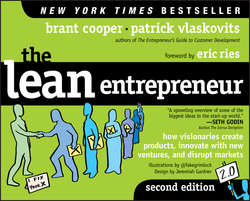Читать книгу The Lean Entrepreneur - Vlaskovits Patrick - Страница 15
На сайте Литреса книга снята с продажи.
1
STARTUP REVOLUTION
MEET THE LEAN ENTREPRENEUR
ОглавлениеThe lean in lean startup does not mean a small startup, or a skinny one. It doesn’t mean a lack of raising or spending money. It doesn’t reflect on the ambition of the founders or whether or not they’re “thinking big.”
The term lean comes from lean manufacturing, as represented by the Toyota Production System, or how Toyota began manufacturing cars in Japan in the 1950s. Basically, lean manufacturing is about optimizing efficiency in all value-adding activities, and minimizing or eliminating all non-value-adding activities, where value-adding means providing value to customers. Customers include both the final user of the product and internal customers who link activities through the life cycle of product development and delivery.10
Value-adding activities are those that directly contribute to the production or delivery of value – for example, assembling part of a car. Non-value-adding activities are those that don’t contribute to the value being produced – for example, forklifting parts from one side of a warehouse to another.
Critically, optimization that adversely affects the value being provided is not lean. We’re not being efficient for efficiency’s sake. Some have criticized American automobile manufacturers for believing that lean was primarily about replacing employees with robots. That may have increased labor productivity, but it also, some would argue, destroyed a portion of the value being created for car buyers. That was perhaps a conscious trade-off, but would not be considered lean.
Some private equity firms have been criticized for taking over struggling companies, dramatically cutting costs by eliminating plant locations and cutting thousands of jobs, only to turn around and sell the companies when the books looked better. That may be wealth creation, but it’s not value creation, and hence it isn’t lean.
Конец ознакомительного фрагмента. Купить книгу
10
Jeffrey K. Liker, The Toyota Way: 14 Management Principles from the World’s Greatest Manufacturer (New York: McGraw-Hill, 2003).
